初二英语时态总汇训练
英语六个时态练习题初二

英语六个时态练习题初二一、时态简介在英语中,时态是用来表示动作发生的时间的,共有6个时态,分别是一般现在时、一般过去时、一般将来时、现在进行时、过去进行时和将来进行时。
下面将分别给出每个时态的定义和用法。
二、一般现在时一般现在时用来表示经常性或习惯性的动作、真理、客观事实等。
例句:1. I go to school every day.(我每天去学校。
)2. The earth revolves around the sun.(地球绕着太阳转。
)三、一般过去时一般过去时用来表示过去发生的动作或状态。
例句:1. I visited my grandparents last weekend.(我上周末去拜访了我的祖父母。
)2. She lived in Paris when she was young.(她年轻时住在巴黎。
)四、一般将来时一般将来时用来表示将来的动作或事件。
例句:1. I will meet my friends tomorrow.(我明天会和我的朋友们见面。
)2. They are going to travel around the world next year.(他们明年将会环游世界。
)五、现在进行时现在进行时用来表示正在进行的动作。
例句:1. She is studying in the library right now.(她正在图书馆学习。
)2. They are playing soccer in the park.(他们正在公园踢足球。
)六、过去进行时过去进行时用来表示过去某一时刻正在进行的动作。
例句:1. They were watching a movie at that time.(他们当时正在看电影。
)2. I was cooking dinner while she was doing her homework.(当她做作业时,我正在做晚饭。
)七、将来进行时将来进行时用来表示将来某一时刻正在进行的动作。
初二英语时态练习题40题
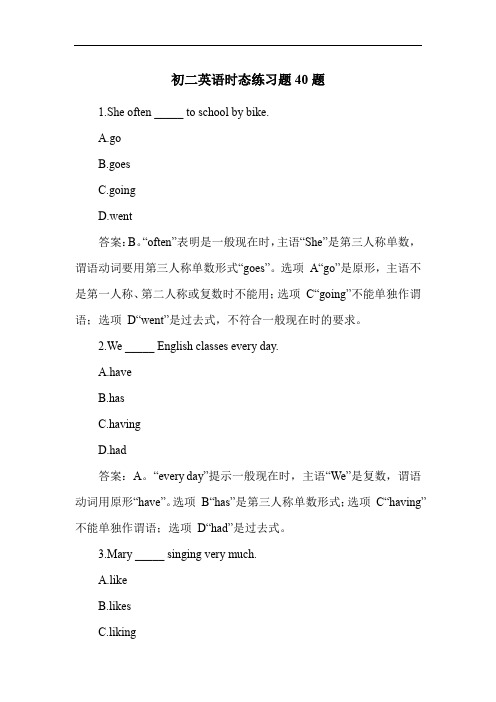
初二英语时态练习题40题1.She often _____ to school by bike.A.goB.goesC.goingD.went答案:B。
“often”表明是一般现在时,主语“She”是第三人称单数,谓语动词要用第三人称单数形式“goes”。
选项A“go”是原形,主语不是第一人称、第二人称或复数时不能用;选项C“going”不能单独作谓语;选项D“went”是过去式,不符合一般现在时的要求。
2.We _____ English classes every day.A.haveB.hasC.havingD.had答案:A。
“every day”提示一般现在时,主语“We”是复数,谓语动词用原形“have”。
选项B“has”是第三人称单数形式;选项C“having”不能单独作谓语;选项D“had”是过去式。
3.Mary _____ singing very much.A.likeB.likesC.liking答案:B。
表示某人的爱好通常用一般现在时,主语“Mary”是第三人称单数,谓语动词用“likes”。
选项A“like”是原形;选项C“liking”不能单独作谓语;选项D“liked”是过去式。
4.The sun _____ in the east.A.riseB.risesC.risingD.rose答案:B。
客观真理用一般现在时,主语“The sun”是第三人称单数,谓语动词“rise”要变成“rises”。
选项A“rise”是原形;选项C“rising”不能单独作谓语;选项D“rose”是过去式。
5.My father _____ to work by car.A.goB.goesC.goingD.went答案:B。
描述日常行为用一般现在时,主语“My father”是第三人称单数,谓语动词用“goes”。
选项A“go”是原形;选项C“going”不能单独作谓语;选项D“went”是过去式。
四个时态练习题初二
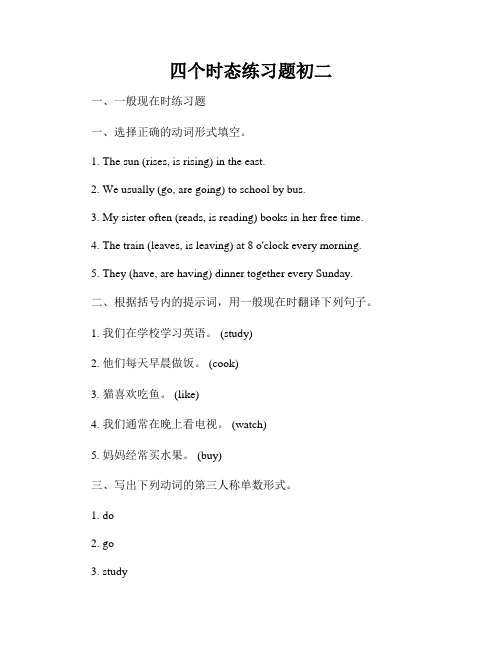
四个时态练习题初二一、一般现在时练习题一、选择正确的动词形式填空。
1. The sun (rises, is rising) in the east.2. We usually (go, are going) to school by bus.3. My sister often (reads, is reading) books in her free time.4. The train (leaves, is leaving) at 8 o'clock every morning.5. They (have, are having) dinner together every Sunday.二、根据括号内的提示词,用一般现在时翻译下列句子。
1. 我们在学校学习英语。
(study)2. 他们每天早晨做饭。
(cook)3. 猫喜欢吃鱼。
(like)4. 我们通常在晚上看电视。
(watch)5. 妈妈经常买水果。
(buy)三、写出下列动词的第三人称单数形式。
1. do2. go3. study5. watch二、一般过去时练习题一、选择正确的动词形式填空。
1. Last night, I (watched, am watching) a movie with my friends.2. We (visited, are visiting) the museum last Sunday.3. He (studied, is studying) English two years ago.4. Sarah (played, is playing) soccer after school yesterday.5. They (ate, are eating) dinner at a restaurant last night.二、根据括号内的提示词,用一般过去时翻译下列句子。
1. 我昨天在公园里踢足球。
初二时态练习及答案

初二时态练习及答案1.I will tell him as soon as he comes back.2.XXX.3.XXX when XXX.4.Does XXX there。
No。
I don't think so.5.Do you hear from your teacher very often。
Certainly.6.Does your mother do some cleaning on Sundays?7.Does Tom have to work hard to help his family。
Yes。
he does.8.XXX to you every day?9.Smith does not go fishing on weekdays。
does he。
Yes。
he does.10.Mr。
Black often goes fishing on Sundays。
doesn't he?11.He usually watches TV on Sunday evenings.12.We'll go play in the snow if it XXX.13.XXX I XXX XXX.14.Nobody knows how to run this machine.15.The Young neer carries water for the old man every day.16.XXX.17.Look。
The boy students are playing XXX.18.He begins to do his lessons at eight every evening.19.Does he get on well with his friends this term?20.Mr。
Smith is XXX stories。
but he is also working on a TV play.21.I go to the cinema。
(完整版)初中英语各种时态练习题集锦
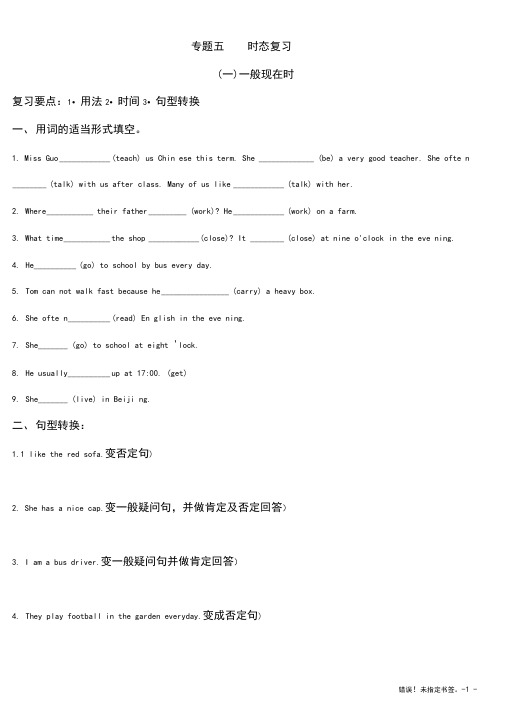
专题五时态复习(一)一般现在时复习要点:1•用法2•时间3•句型转换一、用词的适当形式填空。
1.Miss Guo ____________ (teach) us Chin ese this term. She _____________ (be) a very good teacher. She ofte n ________ (talk) with us after class. Many of us like ____________ (talk) with her.2.Where ___________ their father _________ (work)? He ____________ (work) on a farm.3.What time ___________ the shop ____________ (close)? It ________ (close) at nine o'clock in the eve ning.4.He__________ (go) to school by bus every day.5.Tom can not walk fast because he ________________ (carry) a heavy box.6.She ofte n __________ (read) En glish in the eve ning.7.She_______ (go) to school at eight 'lock.8.He usually __________ up at 17:00. (get)9.She_______ (live) in Beiji ng.二、句型转换:1.1 like the red sofa.变否定句)2. She has a nice cap.变一般疑问句,并做肯定及否定回答)3. I am a bus driver.变一般疑问句并做肯定回答)4.They play football in the garden everyday.变成否定句)5.There is an egg in the basket变成复数形式的句子)(二)一般过去时复习要点:1•用法2•时间3•句型转换一、将下列动词变成过去式。
初二英语四大时态练习题

初二英语四大时态练习题一、一般现在时练习题1. 完成句子:a) My sister _________ (watch) TV every evening.b) They often ___________ (go) to the park on weekends.c) We ________ (like) to play basketball in our free time.d) I _______ (read) a book every night before bed.2. 改错题:将下列句子中错误的地方划线并改正。
a) Tom and Jerry is a funny cartoon. ____________________b) She go to school by bus every day. ____________________c) We plays soccer every Saturday. ____________________d) The cat has two black and white colors. __________________3. 选择题:选择正确的动词形式填入空格。
a) Lucy __________ (brush / brushes) her teeth every morning.b) They ___________ (visit / visits) their grandparents twice a month.c) My dog ___________ (bark / barks) loudly at strangers.d) He usually ___________ (washes / wash) his car on Sundays.二、一般过去时练习题1. 完成句子:a) Yesterday, John __________ (play) soccer with his friends.b) We ___________ (visit) the museum last week.c) She _________ (buy) a new dress for the party.d) The teacher _________ (explain) the lesson carefully yesterday.2. 改错题:将下列句子中错误的地方划线并改正。
初二英语时态的专项练习20篇
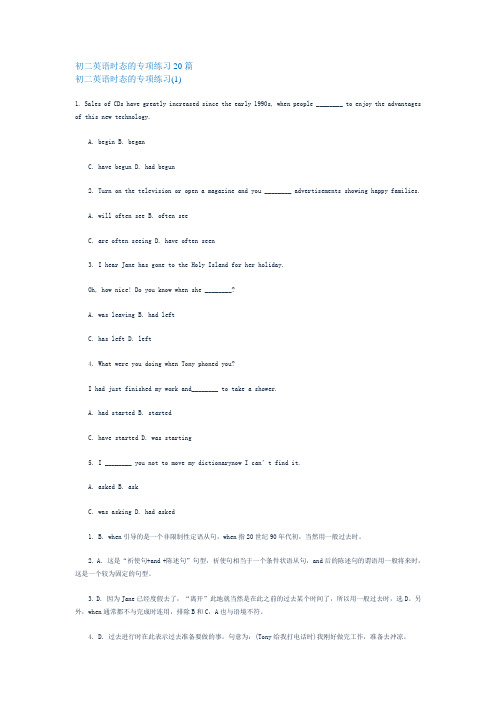
初二英语时态的专项练习20篇初二英语时态的专项练习(1)1. Sales of CDs have greatly increased since the early 1990s, when people ________ to enjoy the advantages of this new technology.A. beginB. beganC. have begunD. had begun2. Turn on the television or open a magazine and you ________ advertisements showing happy families.A. will often seeB. often seeC. are often seeingD. have often seen3. I hear Jane has gone to the Holy Island for her holiday.Oh, how nice! Do you know when she ________?A. was leavingB. had leftC. has leftD. left4. What were you doing when Tony phoned you?I had just finished my work and________ to take a shower.A. had startedB. startedC. have startedD. was starting5. I ________ you not to move my dictionarynow I c an’t find it.A. askedB. askC. was askingD. had asked1. B. when引导的是一个非限制性定语从句,when指20世纪90年代初,当然用一般过去时。
初二英语时态及语态练习题
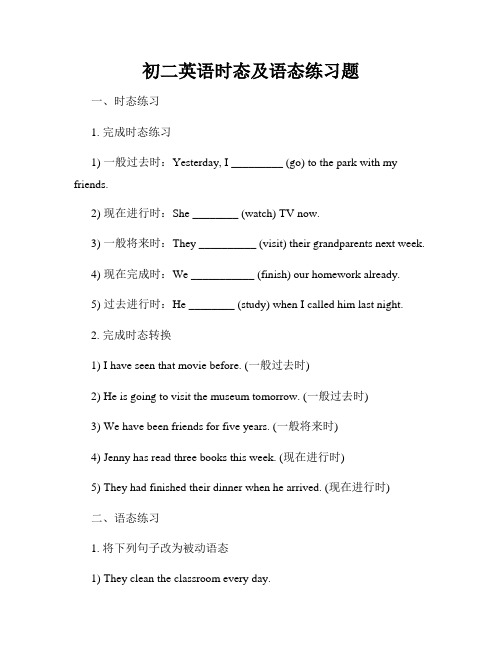
初二英语时态及语态练习题一、时态练习1. 完成时态练习1) 一般过去时:Yesterday, I _________ (go) to the park with my friends.2) 现在进行时:She ________ (watch) TV now.3) 一般将来时:They __________ (visit) their grandparents next week.4) 现在完成时:We ___________ (finish) our homework already.5) 过去进行时:He ________ (study) when I called him last night.2. 完成时态转换1) I have seen that movie before. (一般过去时)2) He is going to visit the museum tomorrow. (一般过去时)3) We have been friends for five years. (一般将来时)4) Jenny has read three books this week. (现在进行时)5) They had finished their dinner when he arrived. (现在进行时)二、语态练习1. 将下列句子改为被动语态1) They clean the classroom every day.2) Someone broke the window last night.3) My sister will bake a cake for me tomorrow.4) She has written a letter to her friend.5) We are painting the walls right now.2. 将下列句子改为主动语态1) The car was repaired by Mark.2) The door was closed by someone.3) A gift will be given to you by me.4) The cake has been made by my mom.5) The book is being read by her.三、时态和语态综合练习1. 根据句意和所给动词的时态要求填空,并将动词改为适当的形式。
- 1、下载文档前请自行甄别文档内容的完整性,平台不提供额外的编辑、内容补充、找答案等附加服务。
- 2、"仅部分预览"的文档,不可在线预览部分如存在完整性等问题,可反馈申请退款(可完整预览的文档不适用该条件!)。
- 3、如文档侵犯您的权益,请联系客服反馈,我们会尽快为您处理(人工客服工作时间:9:00-18:30)。
A. cathcs…dances B. catches… dances C. catchs…dancees
D. catches… dancee
4. _____ he ____ himself there? No, I don't think so.
A. Do…enjoy
B. Does… enjoies
8. Which teacher _____ lessons to you every day ?
A. does …gives
B. does… give
C. do… give
D. gives
9. Smith does not go fishing on weekdays, ____? _____ , he does.
B. have known
C. knows
D. is knowing
15. The Young Pioneer _____ water for the old man every day.
A. carry
B. bring
C. takes
D. carries
16. Some are ______ in the river and some are ______ games.
11. He usually _____ TV on Sunday evening.
A. watch
B. watches
C. watching
D. is watching
12. We'll go to play with snow if it ______ tomorrow.
A. snow
B. snows
一、表格复习
现在 过去 将来 过去 将来
一般 1 2 3 4
初二时态总汇训练
进行 5 6 7 8
完成 9 10 11 12
完成进行 13 14 15 16
现在 过去 将来 过去 将来
一般 1 2 3 4
进行 5 6 7 8
完成 9 10 11 12
完成进行 13 14 15 16
二、强化练习
1. I will tell him as soon as he _____ back
C. will snow
D. snowed
13. Neither I nor he ______ French.
A. speak
B. doesn't speak
C. speaks
D. doesn't speak
14. Nobody ______ how to run this machines.
A. know
C. Does… enjoys
D. Does…enjoy
5. _____ your teacher ____ from them very often? Certainly.
A. Do…hear
B. Does…hear
C. Do… receive
D. receive
6. _____ your mother _____ some cleaning on Sundays?
A. Does…does
B. Do…does
C. Does…do
D. Do… do
7. _____ Tom _____to work hard to help his family ? Yes, he _____.
A. Has… x…does
B. Has…x…does
C. Does…has…has
D. Does… have…does
A. swimming… playing
B. swimming…plaiing
C. swimming… I playing
D. swimming…plaing
17. Look ! The boy students are _____ football while the girls are _____ .
A. does he…No
B. does he…Yes
C. doesn't he…No
D. doesn't he…Yes
10. Mr Black often _____ fishing on Sundays, _____ he ?
A. goes…doesn't
B. goes…isn't
C. doesn't go…does D. doesn't go…is
A. is writing…is writing
B. is writing… writes
C. writes… is writing
D. writes… writes
21. I _____ to the cinema. I ______ there every Sunday.
A. go…go
B. am going… go
C. begin
D. begins
19. _____ he _____ on well with his friends this teB. Does…get
C. Is…getting
D. Is…geting
20. Mr Smith _____ short stories, but he ____ a TV play these days.
C. go… am going
D. am going…am going
22. Look, they______ a good time, ____ they ?
A. have…do
B. have…don't
C. are having…are D. are having… aren't
23. You ______ about the future now, ______ you ?
A. come
B. comes
C. will come
D. came
2. Mary _____ on shoes when she ____ them.
A. tries…buys
B. tries… buies
C. trys… buys
D. trys… buies
3. The girl often ______ cold when she ______.
A. playing… dance
B. playing… dancing
C. play… dancing
D. play… dance
18. He _____ to do his lessons at eight every evening.
A. is beginning
B. is beginning
